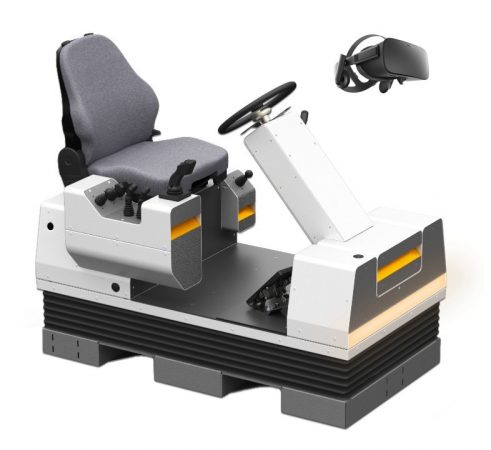
Serious Labs announces development of VR driving simulator with support from government
by CM Staff

Alberta will contribute $1 million to development costs of the simulator, while ERA will contribute an additional $2 million.

Serious Labs VR Simulator concept with Oculus headset (CNW Group/Serious Labs Inc)
EDMONTON — On Apr. 22, Edmonton-based Serious Labs announced that it is developing a virtual reality (VR) commercial truck driving simulator with support from the Government of Alberta, Emissions Reduction Alberta (ERA), and the Alberta Motor Transport Association (AMTA). Alberta will contribute $1 million to development costs of the simulator, while ERA will contribute an additional $2 million. AMTA is providing data and guidance to ensure that the simulator meets transportation industry needs.
Serious Labs, will design, manufacture, and pilot the simulator in Alberta. Commercial deployment is estimated to begin in 2024, with the simulator to be made available across Canada and the United States.
“Our new VR driving simulator will not only help to create an expedited route to proficiency and safety for drivers, but a better, cleaner environment overall by lowering greenhouse gas emissions from both training and day-to-day operation,” said Jim Colvin, CEO of Serious Labs.
Mandatory Entry Level Training (MELT), the new training standard deployed throughout Canada for Class 1 and Class 2 commercial drivers, will become mandatory for all provinces by 2024. MELT is designed to increase the skill level and safety of commercial drivers by providing more training and practice. It requires that each new driver obtain over 100 hours of training time, including 76 and a half hours of in-cab driving time, before being issued a license.
Canada’s transportation industry is facing a labour shortage of over 20,000 commercial drivers which is projected to worsen in the coming years. “While the new MELT requirements are excellent news for increasing safety standards, it means more time as well as greater costs for training centers, more emissions, and makes entering the industry more difficult for new drivers,” said Wade Carson, Senior Product Director at Serious Labs.
The increased hours required for MELT training will also increase emissions. It is estimated that between 2023-2030, the Canadian trucking industry will contribute more than 5,650,000 tons of greenhouse gases while commercial drivers are being trained.
The new commercial truck simulator is projected to significantly reduce this number. For each driver trained using a blend of VR and in-vehicle training, Serious Labs estimates a reduction of 80% of greenhouse gas emissions compared to the traditional approach. As the simulator launches and becomes more widespread, Serious Labs projects it will displace 40% of emissions—more than 2,260,000 tonnes—produced in training between 2023-2030. By 2030, the simulator will be reducing 55% of MELT-driven emissions on an annual basis. By ingraining best practices, the simulator will also enable drivers to reduce emissions from day-to-day operations by 2.8%.